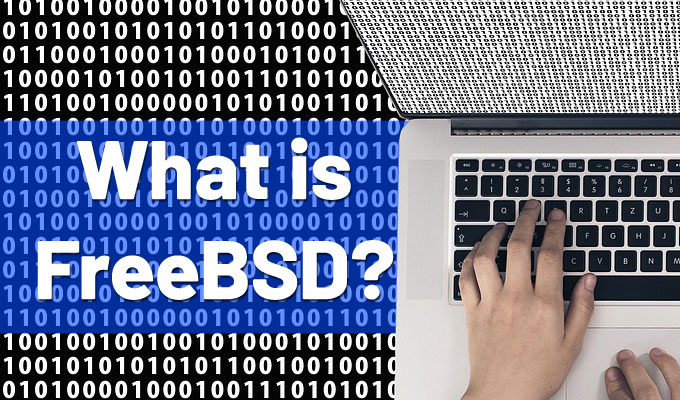What is FreeBSD?

FreeBSD is an operating system based on 4.4BSD-Lite. It is designed for Intel (x86) architecture and DEC Alpha architectures.
What can FreeBSD do?
Freebsd has a lot of advantages. Here are some of them:
- Multitasking – with dynamic priority tuning to ensure that your applications and users can share your computer efficiently, even when the system is heavily loaded.
- Multi -user – allows multiple users to share a computer with FreeBSD at the same time. This means, for example, that printer-type devices, drives can be used by many network users, and it is possible to restrict selected users / groups access to certain services, which helps to eliminate the problem of system overload.
- Networking – excellent TCP / IP solutions with support for SLIP, PPP, NFS, DHCP and NIS. This means more or less that FreeBSD can easily cooperate with other operating systems as well as play the role of a server in a large organization, providing services like NFS, mail, and going to the world – to the Internet: www, ftp, routing u) packages or security – firewall.
- Memory protection – guarantees that applications or users can not interfere with others. In other words, a user’s program failure will not affect the operation of the system for other users in any way.
- 32-bit – FreeBSD is a 32 bit system (64 for Alpha architecture).
- X Window System – has a graphical user interface cooperating with the majority of popular graphics cards and monitors.
Compatibility – has the ability to run programs compiled for Linux, SCO, SVR4, BSDI and NetBSD. - Readiness – has thousands of ready-to-use applications. All this is available in the collection of ports and packages. There is no need to search the web, everything can be found there.
- Add – ons – thousands of easy-to-install applications. FreeBSD is compatible with most UNIX systems, so small code corrections are enough to properly compile and run a program dedicated to other systems.
- Virtual memory – and a shared “VM / buffer cache” designed to simultaneously efficiently satisfy applications with a high appetite on memory, as well as interact with other users.
- SMP – support for machines with multiple processors.
- C, C ++, Fortran, Perl – complete environments. In addition, the possibility of installing many, many others thanks to the collection of ports.
- Source code – available for the entire system, and thus you get excellent control over the whole environment. Why be condemned to the system provider when you can have a truly open system?
- Documentation – online system documentation is still being expanded.
- And many others!
FreeBSD is based on the 4.4BSD-Lite system from the Computer Systems Research Group (CSRG) of the University of California, Berkeley. It maintains the distinguished tradition of the development trend of BSD systems. After the excellent work done by CSRG, many thousand hours were spent on FreeBSD to improve it and prepare for life’s difficult situations. If you ask for an operating system with great achievements and a system that you can rely on – the answer is one – FreeBSD.
The number of applications that can be used by FreeBSD is limited only by your imagination. From programming software, through automation from factories, accounting, to azimuth control of a satellite dish – all of this can be done not only in commercial versions of Unix, but also in FreeBSD. He himself is supplied from day to day with an increasing number of free, but perfectly polished applications, often coming from university development centers. There is also the possibility of acquiring commercial software, the number of which is growing as fast as free software.
As the FreeBSD source code is made public, the system can be tuned for many specialist projects and applications, which is generally not feasible for commercial systems. Here’s a small list of applications that FreeBSD is most often used with:
- Internet services: excellent TCP / IP support embedded in FreeBSD, makes us an ideal platform for a number of Internet services, for example:
- FTP servers;
- World Wide Web servers (standard or SSL encrypted);
- Firewall and NAT gateways (IP Masquerading);
- E-mail servers;
- USENET servers;
- and other…
- Education: Are you an IT student? There is no better way to get to know the operating system, computer architecture and network issues. A large number of free CAD, mathematical and graphic programs will be very useful for those whose most important interest is to do the work on the computer.
- Discoveries: With available source code for the entire system, FreeBSD is an excellent platform for searching for new solutions related to operating systems and other computer science industries. The open source idea also supports entire groups cooperating remotely over various tasks, helping them to forget about problems related to special license terms and restrictions.
- Network: Do you need a new router? Name server (DNS)? Firewall to beware of unauthorized users? FreeBSD can easily replace a useless 486 or even 386, standing in a corner, into an advanced router with sophisticated packet filtering options.
- The graphical environment: FreeBSD is a good choice when it comes to the X Window environment. You can choose between the free XFree86 server or one of the commercial applications. Inexpensive is the X terminal solution, where only one central machine must be strong, and the other can even be diskless, which, of course, simplifies administration.
- Programming: The FreeBSD system is equipped with a full set of programming tools, including, for example, a refurbished compiler and a GNU C / C ++ debugger.
Who uses FreeBSD?
FreeBSD is used to serve many of the largest websites, including:
- Yahoo!
- Apache
- Be, Inc.
- Blue Mountain Arts
- Pair Networks
- Whistle Communications
- Microsoft
- Hotmail
- Sony Japan
- and many others.
Based on www.freebsd.org/handbook/
